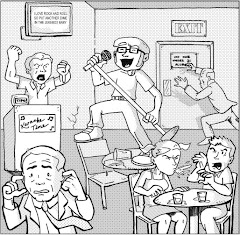Bombast #1, April 2003, Topps Comics
writers: Roy Thomas & Gary Friedrich
artists: Dick Ayers & John Severin
letterer: Jean Simek
editors: Dwight Jon Zimmerman & Jim Salicrup
based on concepts by: Jack Kirby
As I mentioned yesterday, this weekend being that of Memorial Day, I wanted to honor the veterans of the comic book industry by reviewing some of their work, and when I flipped through the stack of "yet-to-reads" before embarking on my road trip to visit friends and family in Arizona, I was fortunate enough to find Kitchen Sink Press' The Spirit #40 and Topps Comics' Bombast #1. While both of these comics feature the respective works of Will Eisner and Jack Kirby, perhaps the most notable of anyone considered "comics veterans," the companies in question take this material a step further, each intentionally packaging these titles with a retrospective respect, and each doing so in a contrasting but equally effective way. They are memorial comics, without this holiday's context of militant battle, sure, but just as durable against the bitter enemy of time, which is often the industry's greatest nemesis anyway.
Though I succinctly addressed The Spirit #40 yesterday, I need to embellish one more point, if only to prove my assertion about Eisner's timelessness: I've been wondering how to address my thoughts about Rosie O'Donnell's departure from The View, since on my LiveJournal I have confessed an appreciation for her (pardon the pun) bombastic presence on that show. See, my impression of the Rosie/Elizabeth feud is simple: it was inevitable, not because of their differing political views, but because they are women, who are by nature emotional and competitive creatures, which may seem like a sexist statement (albeit proven in gentler tones in most gender study self-help books) if not for the second story in this Spirit reproduction, called "A Slow Ship to Shang-Hai." Therein, the Spirit is captured in her sophomore appearance by villainess Thorne Strand, who is in turn hijacked by Captain Long Jane Silver and her all-woman crew. While contemplating his escape, the Spirit is secretly approached by two different women, who, when they discover their mutual treachery, fight one another and offer the Spirit an adequate cover for flight. In his admitted spoof on the concept of Amazonian dominance, Eisner essentially suggests that a group of women cannot be without its emotional competitors . . . which is how I feel about last week's scrap on The View. Thank you, Mr. Eisner, for retaining enough contemporary relevance to prove my point for me!
Bombast #1 is a little less transparent in its sociopolitical parallels, but the concept of a hero out of time represents the very use of this concept in the first place. See, in the early '90s, Topps Comics utilized some unused concepts by Jack Kirby (one of which, Satan's Six, I've already reviewed), to create a "Kirbyverse" imprint, a timely move since "the King" passed away less than a year later. Such is the contrast between this issue and Kitchen Sink's approach; where Kitchen Sink merely reprinted Eisner's stories with academic commentary by editor Dave Schreiner, Topps embellished Kirby's work, which, despite its pre-production/early development status, could've been published "as is" to provide insight to the artist's creative process. Both strategies are legitimate and marketable, and though I personally prefer the former, the latter has its moments of proactive entertainment and significance. For example, when Bombast is roused from his 15,000 year slumber, his obvious language barrier is an ironic commentary, since, even if the hibernating hero spoke English, he would by no means understand the "jive talk" of his makeshift guide, a "dark lad" running from his drug dealers. Further, when Bombast encounters local law enforcement, including Kirby fan Erik Larsen's Savage Dragon, a connection can be made between the Silver Age's wanton treatment of vigilante justice versus the contemporary conundrum of "real world" consequences in comics. In other words, Kirby's heroes rarely thought twice about donning a costume and fighting crime, whereas today's heroes usually fight the police or the government while battling evil-doers. Bombast is a hero out of his own time in more ways than one, and it makes for a fun but challenging journey for all parties involved.
At the end of Bombast #1, the one-shot leads into Topps' "Secret City Saga," their Kirbyverse crossover, so, although the character is lost in an ensemble cast, his brief singular impression is a lasting one. Like the Spirit, Bombast acts on behalf of his creator and operates outside of the confines of time, retaining a relevance even beyond the confines of their respective stories. Though the industry and fans alike strive to remember the talent that established the comic book medium as the viable art form that it is today, thanks to their seemingly endless pool of ambitious ideas, the likes of Eisner and Kirby have made it too easy.
ITEM! An interesting dialogue has begun on an Image Comics message board about my post re: "swipes" and plagiarism in comic book art. Even Erik Larsen has posted a brief comment! I'm going to post a reply myself sometime soon, but check it out and contribute!
Sunday, May 27, 2007
Subscribe to:
Post Comments (Atom)



No comments:
Post a Comment